庞珣
第三届亚洲政治学定量研究方法年会
THE 3rd ASIAN POLITICAL METHODOLOGY MEETING
2016年1月8至9日
北京·清华大学
各位政治学与国际关系学同仁:
第三届亚洲政治学定量研究方法年会将于2016年1月8至9日在清华大学举办,敬请各位关注和支持。年会旨在促进亚洲国家政治学和国际关系定量方法研究与教育的发展,搭建学术交流平台。会议采用论文报告和海报展示两种主要形式,并邀请世界著名政治学定量方法研究者做主旨演讲。
本届年会由清华大学国际关系学系主办、普林斯顿大学政治学系“定量与分析政治科学中心”协办。年会将有12篇论文、22张学术海报在大会上进行报告,参会研究者来自中国、中国香港、日本、韩国、新加坡、澳大利亚、美国、英国、德国、荷兰、挪威、土耳其等12个国家和地区。会议内容附后。
主讲嘉宾简介
Andrew D. Martin

Professor, Dean, Andrew D. Martin
美国密西根大学文理学院院长(the dean of the College of Literature, Science, and the Arts)、政治学和统计学教授。他的定量研究推动了美国司法政治实证研究的发展,其中运用广泛的Martin-Quinn Scores即是以他的名字命名。
Professor Jeff Gill
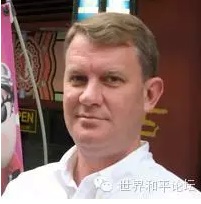
Professor Jeff Gill
美国华盛顿大学圣路易斯分校政治学和生物统计学教授,美国政治学方法学会主席(2009-2011),主要研究方向为贝叶斯统计方法、马科夫链—蒙特卡洛计算模拟方法、模型决策分析等。
第一届和第二届年会主旨演讲嘉宾为Gary King (哈佛大学)、Kevin Quinn(加利福尼亚大学伯克利分校)和Simon Jackman(斯坦福大学)

会议日程(暂定)
Asian PolMeth III
January 8-9, 2016
Schedule
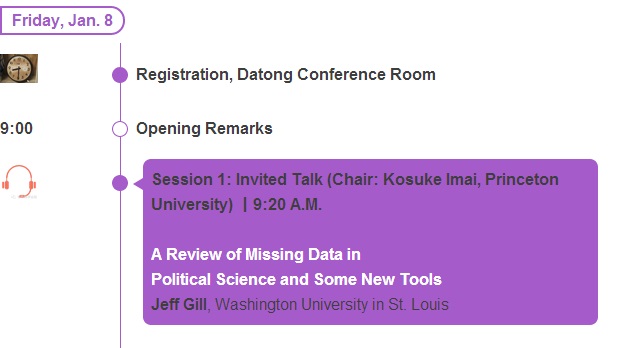
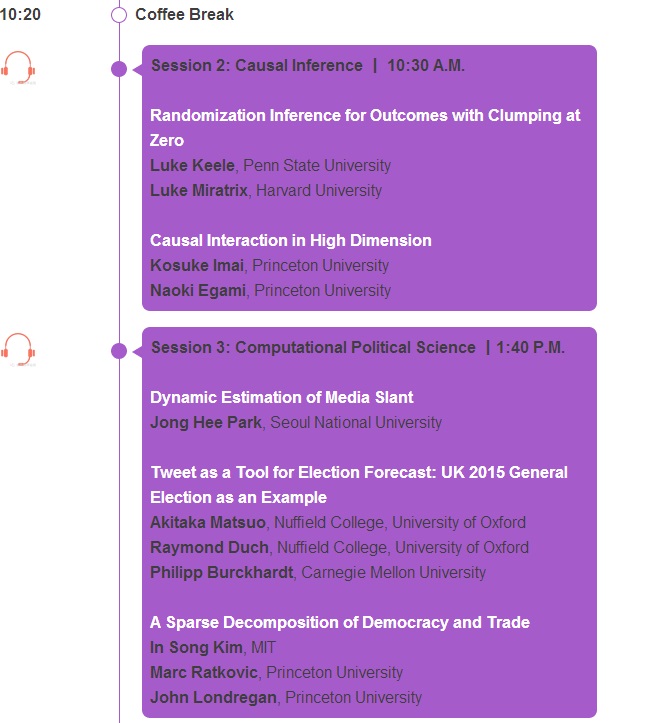

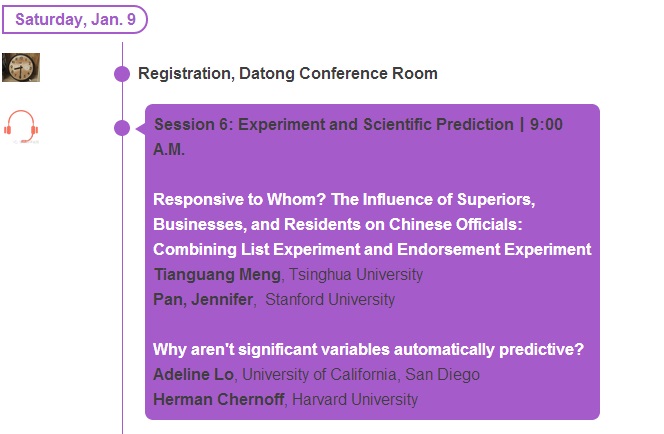
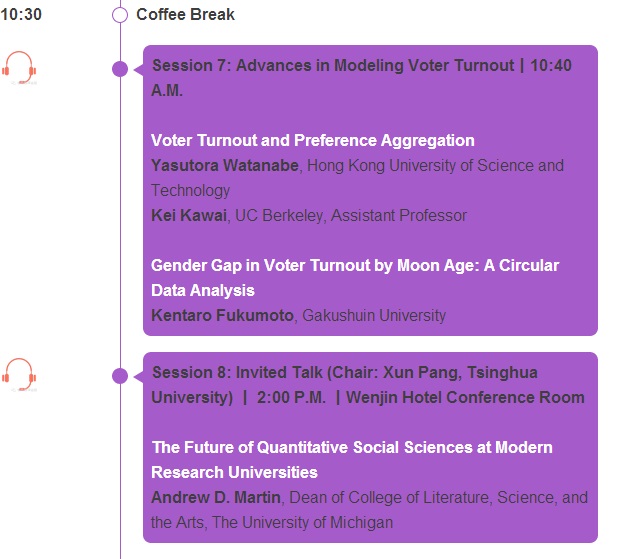
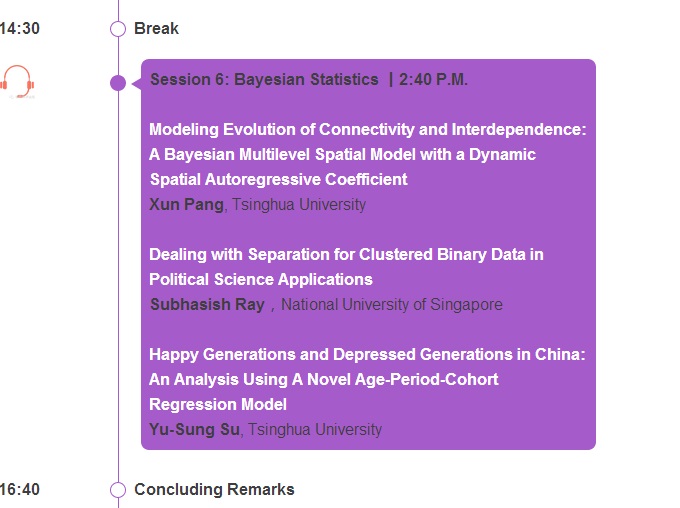
List of Posters
1.“Selective Charity: Measuring Public Trust in the PRC,”Dimitar Gueorguiev, Syracuse University
2.“Predicting the escalation of violent conflict for subnational regions in Africa / Asia: A new methodological approach,”Tim Tepel, Bundeswehr University Munich (University of the German Federal Armed Forces)
3.“Resist Concrete Policy Commitments and Let Your Partisan Reputation Reveal The Rest,”Nick Lin, University of Mannheim
4.“Characterizing Punctuated Equilibrium in Comparative Analysis,”Kwan Nok Chan, The University of Hong Kong
5.“Unsupervised Algorithms in International Politics,”Wu Jiang, Tsinghua University
6.“Japan and Immigration: a multilevel analysis of public opinion,”David Green, Nagoya University, Graduate School of Law
7.“Measuring Foreign Policy Preferences From Interstate Interactions,”Jeffrey Weber, Ipek University
8.“Trust, efficacy and political activism across different regime types: A cross-country comparative study based on Asia Barometer,”Yan Zhu, Shanghai Academy of Social Sciences
9.“The Process and Mechanism of Party Identification Formation,”Su Chuan Ma, Engineering University of CAPF
10.“Does Democracy Cause Trade Policy Liberalization? An Empirical Investigation Using Instrumental Variable (IV) Method,”Xiang Andrew Li, National University of Singapore
11.“Political regimes and economic growth: An empirical test of an economic model of dictatorship,”Nakamura Kosuke, Yokohama City University
12.“Are Liberal Democrats in China Liberal Democrats? A Finite Mixture Model Approach on China Survey Data 2011,”Kyu Won Lee, Seoul National University
13.“Political judgment under traumatic memories: An experimental study on testing information-processing model,”Lumin Fang, The University of Konstanz
14.“Elections and Ethnic Conflict: A Stochastic Actor-Based Network Analysis of Sri Lanka,”Chenbo Yang, Chinese University of Hong Kong
15.“Issue cross-pressures and swing voting,”QingQian He, Universtiy of Twente
16.“Modeling High Dimensional Data with Pair-Copulas: An Application to Duration Data with Sample Selection and Multiple Events,”Soichiro Yamauchi, University of Tokyo
17.“Partisanship, Constituency Interests and US China Policy: Differing Perceptions and Positions to China in the US Congress,”Suji Kang, Seoul National University
18.“Age, Promotion and Fiscal Extraction,”Yu, Hong Kong University of Science and Technology
19.“State Space Models for the Dynamics of Party Support in Britain, 2010-2015,”Harold Clarke, University of Texas at Dallas
20.“Authoritarian Elections, Electoral Integrity, and Political Instability: Dangerous Choices from the Menu of Manipulation?”Benjamin Goldsmith, University of Sydney
21.“Consequence of Chinese Aid to Africa: How American Aid Becomes Less Effective in UNGA Vote Buying,”Shai Wang, Tsinghua University
22.“The Impact of Informal Political Participation on Government's Trust in China--Based on the Data of CGSS 2010,”Qingyan Wang, Hong Kong University of Science and Technology

